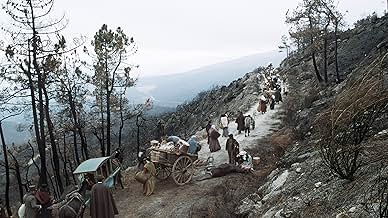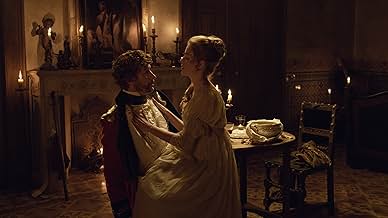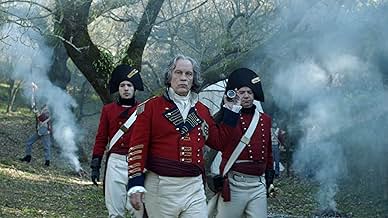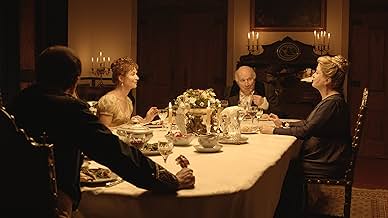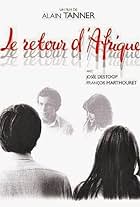IMDb RATING
6.0/10
1.7K
YOUR RATING
An Anglo-Portuguese army led by General Wellington retreats to the fortified lines of Torres Vendras after a battle with Napoleon Bonaparte's army in 1810.An Anglo-Portuguese army led by General Wellington retreats to the fortified lines of Torres Vendras after a battle with Napoleon Bonaparte's army in 1810.An Anglo-Portuguese army led by General Wellington retreats to the fortified lines of Torres Vendras after a battle with Napoleon Bonaparte's army in 1810.
- Awards
- 9 wins & 18 nominations total
- Director
- Writer
- All cast & crew
- Production, box office & more at IMDbPro
Featured reviews
"As Linhas de Wellington" is a war drama made, in co-production, by Portugal and France, and portrays the final phase of the French Invasions in Portugal. Defeated in the Battle of Bussaco, the soldiers of the French general Massena continue towards Lisbon, forcing the Anglo-Portuguese armies to retreat to the Lines of Torres Vedras, a massive set of artillery fortifications and entrenched paths designed not to let the invader pass, and also, protect a possible British withdrawal from the country. Without means and weapons to force the passage, Massena will come to give up the invasion, retreating to Spain, months later, always chased by British soldiers.
Well, I tend to be a little pessimistic about Portuguese cinema, but considering the big budget of the film and the big names involved in the cast I decided to give it a try. And, I confess, I was impressed by the quality of the final product, much higher than normal for Portuguese cinema.
Let's first talk about the technical details of the film, which I think is one of its strongest points. In fact, it is rare for a film in Portugal to have such good production values. Here we have an excellent photograph, impeccable scenery, excellent costumes and makeup, faithful to the period portrayed, a good job of filming and editing and also a very good soundtrack, which is in your ear. It is perfectly possible to see where so much money has been spent, and well spent. I think the film is a little dark, in that gray is a very present color in photography, but I think it combined well with the plot and ambience of the film.
Another point where the film exceeded my expectations was the cast and their work. The most resonant name is that of John Malkovich, an actor twice nominated for Oscar, well known in Hollywood and who has resided in Portugal for some years. Being the cast's most resonant name, it should have a presence and protagonism in the plot ... but the script is limited to showing Wellington discussing with his painter, in philosophical ramblings about a steak or in moments of meditation, with lighted candles. It is manifestly little work for an actor like Malkovich, which can be a nonsense, depending on the money he earned from the film. Not to mention that, unlike Malkovich, Wellington was younger and had short hair. Also other big names, like Isabelle Huppert, Melvil Poupaud, Catherine Deneuve and her daughter, Chiara Mastroianni, only appear in cameo. That is, the great actors who could boost the film with their talent and give the Portuguese cast something to learn are rarely used, they just appear and help the film to sell. That is, to say the least, stupid.
The real cast, which really appears and represents, is composed of a hard core where we see good Portuguese actors like Nuno Lopes (a sergeant from a Portuguese Battalion of Hunters), Marisa Paredes (a Spanish widow), Carloto Cotta (a Portuguese officer) , Victoria Guerra (a fiery Englishman), Marcello Urgeghe (a British officer), Jemima West (the bride of an English officer who dies in the conflict), Miguel Borges (a usurer merchant), Filipe Vargas (an aristocrat in search of his missing wife ), Adriano Luz (a Portuguese poet, initially at the side of the French, who disappoints and deserts to fight on the Portuguese side) Elsa Zylberstein (a nun), Albano Jerónimo (a priest who takes up arms against the French), Joana de Verona (a woman struggling to avenge her son's death and the abuses she suffered), Gonçalo Waddington (a spy), Maria João Bastos (the aristocrat's wife) and Paulo Pires (a military officer). Everyone was reasonably well, but Nuno Lopes, Jemima West, Adriano Luz and Albano Jerónimo deserve special congratulations for their good work. I would also highlight Joana de Verona, to whom the film reserves one of the most suffered and dramatic characters. Victoria Guerra also does a good job and has an excellent English accent, but the scenes where she appears naked are expendable and could have been cut, had it not been for the bad Portuguese habit of involving sex in everything.
Anyone who expects to see a war film, or a historical film, will certainly be disappointed. The historical personages are limited to appearing fleetingly, the historical facts are portrayed, but the film is not about them. We hardly see a fight scene, with the exception of a few skirmishes. It is a film about ordinary people, whom the war deeply affects, and about their personal dramas. Seen in this light, it is a competent film, which has more quality than the garbage that Portuguese cinema usually presents. But it is far from perfect and there is an underuse of notable actors that is not understood, except for possible issues related to the fee to be paid.
Well, I tend to be a little pessimistic about Portuguese cinema, but considering the big budget of the film and the big names involved in the cast I decided to give it a try. And, I confess, I was impressed by the quality of the final product, much higher than normal for Portuguese cinema.
Let's first talk about the technical details of the film, which I think is one of its strongest points. In fact, it is rare for a film in Portugal to have such good production values. Here we have an excellent photograph, impeccable scenery, excellent costumes and makeup, faithful to the period portrayed, a good job of filming and editing and also a very good soundtrack, which is in your ear. It is perfectly possible to see where so much money has been spent, and well spent. I think the film is a little dark, in that gray is a very present color in photography, but I think it combined well with the plot and ambience of the film.
Another point where the film exceeded my expectations was the cast and their work. The most resonant name is that of John Malkovich, an actor twice nominated for Oscar, well known in Hollywood and who has resided in Portugal for some years. Being the cast's most resonant name, it should have a presence and protagonism in the plot ... but the script is limited to showing Wellington discussing with his painter, in philosophical ramblings about a steak or in moments of meditation, with lighted candles. It is manifestly little work for an actor like Malkovich, which can be a nonsense, depending on the money he earned from the film. Not to mention that, unlike Malkovich, Wellington was younger and had short hair. Also other big names, like Isabelle Huppert, Melvil Poupaud, Catherine Deneuve and her daughter, Chiara Mastroianni, only appear in cameo. That is, the great actors who could boost the film with their talent and give the Portuguese cast something to learn are rarely used, they just appear and help the film to sell. That is, to say the least, stupid.
The real cast, which really appears and represents, is composed of a hard core where we see good Portuguese actors like Nuno Lopes (a sergeant from a Portuguese Battalion of Hunters), Marisa Paredes (a Spanish widow), Carloto Cotta (a Portuguese officer) , Victoria Guerra (a fiery Englishman), Marcello Urgeghe (a British officer), Jemima West (the bride of an English officer who dies in the conflict), Miguel Borges (a usurer merchant), Filipe Vargas (an aristocrat in search of his missing wife ), Adriano Luz (a Portuguese poet, initially at the side of the French, who disappoints and deserts to fight on the Portuguese side) Elsa Zylberstein (a nun), Albano Jerónimo (a priest who takes up arms against the French), Joana de Verona (a woman struggling to avenge her son's death and the abuses she suffered), Gonçalo Waddington (a spy), Maria João Bastos (the aristocrat's wife) and Paulo Pires (a military officer). Everyone was reasonably well, but Nuno Lopes, Jemima West, Adriano Luz and Albano Jerónimo deserve special congratulations for their good work. I would also highlight Joana de Verona, to whom the film reserves one of the most suffered and dramatic characters. Victoria Guerra also does a good job and has an excellent English accent, but the scenes where she appears naked are expendable and could have been cut, had it not been for the bad Portuguese habit of involving sex in everything.
Anyone who expects to see a war film, or a historical film, will certainly be disappointed. The historical personages are limited to appearing fleetingly, the historical facts are portrayed, but the film is not about them. We hardly see a fight scene, with the exception of a few skirmishes. It is a film about ordinary people, whom the war deeply affects, and about their personal dramas. Seen in this light, it is a competent film, which has more quality than the garbage that Portuguese cinema usually presents. But it is far from perfect and there is an underuse of notable actors that is not understood, except for possible issues related to the fee to be paid.
I watched this film, all 150 minutes of it, from a DVD I received from FilmMovement. Apparently this film, a European production, is hardly known in North American.
At 150 minutes this is one long film, and if you expect to see epic battle scenes you will be disappointed. The story centres around the English and Portuguese armies retreating, with many civilians, from the advent of the Napoleonic army. There are many characters involved in several sub-plots, and three languages (English, French and Portuguese) are used in the dialogues. One can get confused easily.
Despite its flaws, I find the film watchable for the settings, for the costume, and for certain portions of the human dramas depicted. And forget about the presence of the two big-name French actresses referenced in the credit. Both Isabelle Hupert and Catherine Deneuve appeared in an inconsequential scene for less than two minutes.
At 150 minutes this is one long film, and if you expect to see epic battle scenes you will be disappointed. The story centres around the English and Portuguese armies retreating, with many civilians, from the advent of the Napoleonic army. There are many characters involved in several sub-plots, and three languages (English, French and Portuguese) are used in the dialogues. One can get confused easily.
Despite its flaws, I find the film watchable for the settings, for the costume, and for certain portions of the human dramas depicted. And forget about the presence of the two big-name French actresses referenced in the credit. Both Isabelle Hupert and Catherine Deneuve appeared in an inconsequential scene for less than two minutes.
Back to the napoleon invasions the Portuguese people try to refuge ,along with the Portuguese and english army, on the wellington lines, designe by general wellington to prevent the french army to invade Portugal.
The movie doesn't have one linear story. The story is divided until in some points of the storyline they all come together.
The movie has some moments of tension, the photography is very beautiful despite not being very ambitious but it fits and helps the movie to tell the story.
I think the big mistake of this picture is the division of the storyline. I get it that maybe the writers and directors want to give the perspective that there wasn't only one hero, but multiple hero's.
The second mistake is the lack of danger, the only time that we get to experience fear for the life of the characters the problem is very easily solved.
There's some characters that dont bring nothing to the movie, and the ones who make the difference are badly developed because we I already mention the division of the storyline.
Despite all of that the movie as a overall good story, great performances , great shooting. I just feel sorry for the great build up of some situation so at the end as a pretty easy resolution. This movie is a 7 maybe a 7.5.
A historical drama co-produced by Portugal and France. The plot takes place post Battle of Bussaco (27-09-1810) while the population and the Anglo-Portuguese troops make the strategic withdrawal for the Lines of Torres Vedras, erected by order of General Wellington, in an attempt to make a final decisive stand against the advance of the Napoleonic Army lead by Marechal Massena.
A film that had everything to be extraordinary and perhaps even a striking epic of the Portuguese cinema, with a budget around 5 million Euros, it is revolting that it does not contain a single battle scene, just two brief skirmishes. It follows too many characters none of them of consequence on the grand scheme of the theme portrayed (except Wellington and Massena), so the audience does not empathize with any of them, even with a length time of 151 minutes (2h:31m). I guess all the money went to scenery, costumes and some 'big name' actors that hardly show for a maximum of 5 minutes to quickly disappear and never be seen again. I know that the focus of this movie is on the common folks, their plights and efforts during such a terrible event, but the movie is called "Lines of Wellington", not "Evacuation to Torres Vedras"! Therefore the title is misleading, being more a soap-opera with a thematic backdrop then properly a movie about the title's theme.
So I assumed the plot would revolve around the two most influential personalities related to the event: Massena (Melvil Poupaud) and Wellington (John Malkovich). But Massena hardly has any screen time, and when he does, he rarely talks! He also should have been played by someone at least ten years older, just as the real Massena was during that time. And Wellington, who also should have been played by someone at least twenty years younger like the real Wellington was during that time, just comes out as a pompous ass, which really annoys me: sure he was pompous due to his historical, social and upbringing context, but I doubt he was an ass even more amidst a military campaign as portrayed by Malkovich! And then when comes that scene where he recites the Beef Wellington recipe, I swear I never before in my entire life felt so compelled to punch the screen! There is no proof that the two are related! John Malkovich, you are a nice actor, but I will never forgive you for making an ass out of one of the greatest European heroes, the man who defeated Napoleon Bonaparte! And your hair is ridiculous: Wellington was ahead of his time and already wore it short.
I really have no clue to what was the producers' idea behind this grotesque travesty. Have they made any minimal research? The majority of characters are purely fictional. The acting is just ordinary, except Victoria Guerra that really uplifts the scene when on screen. The soundtrack is nice but nothing epic and a bit monotonous. And don't even tell me about the 'not so' outstanding technical aspects because nowadays it is no hardship to get outstanding settings and costumes for period movies, so that does not count! - I know it should, but I won't.
For those who want to have a true historical perspective of this event and its most outstanding characters, please buy a book on the subject or consult Wikipedia because from this movie you learn nothing. The only payoff is 2 or 3 interesting dialogues and to see Soraia Chaves and Victoria Guerra naked, but not even that is sufficient to save this movie from being on my (short) list of the most hated ones.
A film that had everything to be extraordinary and perhaps even a striking epic of the Portuguese cinema, with a budget around 5 million Euros, it is revolting that it does not contain a single battle scene, just two brief skirmishes. It follows too many characters none of them of consequence on the grand scheme of the theme portrayed (except Wellington and Massena), so the audience does not empathize with any of them, even with a length time of 151 minutes (2h:31m). I guess all the money went to scenery, costumes and some 'big name' actors that hardly show for a maximum of 5 minutes to quickly disappear and never be seen again. I know that the focus of this movie is on the common folks, their plights and efforts during such a terrible event, but the movie is called "Lines of Wellington", not "Evacuation to Torres Vedras"! Therefore the title is misleading, being more a soap-opera with a thematic backdrop then properly a movie about the title's theme.
So I assumed the plot would revolve around the two most influential personalities related to the event: Massena (Melvil Poupaud) and Wellington (John Malkovich). But Massena hardly has any screen time, and when he does, he rarely talks! He also should have been played by someone at least ten years older, just as the real Massena was during that time. And Wellington, who also should have been played by someone at least twenty years younger like the real Wellington was during that time, just comes out as a pompous ass, which really annoys me: sure he was pompous due to his historical, social and upbringing context, but I doubt he was an ass even more amidst a military campaign as portrayed by Malkovich! And then when comes that scene where he recites the Beef Wellington recipe, I swear I never before in my entire life felt so compelled to punch the screen! There is no proof that the two are related! John Malkovich, you are a nice actor, but I will never forgive you for making an ass out of one of the greatest European heroes, the man who defeated Napoleon Bonaparte! And your hair is ridiculous: Wellington was ahead of his time and already wore it short.
I really have no clue to what was the producers' idea behind this grotesque travesty. Have they made any minimal research? The majority of characters are purely fictional. The acting is just ordinary, except Victoria Guerra that really uplifts the scene when on screen. The soundtrack is nice but nothing epic and a bit monotonous. And don't even tell me about the 'not so' outstanding technical aspects because nowadays it is no hardship to get outstanding settings and costumes for period movies, so that does not count! - I know it should, but I won't.
For those who want to have a true historical perspective of this event and its most outstanding characters, please buy a book on the subject or consult Wikipedia because from this movie you learn nothing. The only payoff is 2 or 3 interesting dialogues and to see Soraia Chaves and Victoria Guerra naked, but not even that is sufficient to save this movie from being on my (short) list of the most hated ones.
Had everything to work...good cast, beautiful landscapes, and a very good story...
Unfortunately, there's no movie director in this god forsaken country, that knows what "action"means...to do a movie like this, without any battle scenes, in absurd, at least...
So, don't bother... it's very very boring...
Storyline
Did you know
- TriviaDirector Raúl Ruiz died in August 2011 during preproduction. Producer Paulo Branco offered the job of directing to actor John Malkovich, but Malkovich felt he wouldn't be able to do justice to Ruiz's vision, recommending instead Ruiz's widow and long-time collaborator, Valeria Sarmiento.
- ConnectionsEdited from Lines of Wellington (2012)
- How long is Lines of Wellington?Powered by Alexa
Details
- Release date
- Countries of origin
- Official sites
- Languages
- Also known as
- The Lines of Wellington
- Filming locations
- Production companies
- See more company credits at IMDbPro
Box office
- Budget
- €4,800,000 (estimated)
- Runtime2 hours 31 minutes
- Color
- Aspect ratio
- 2.35 : 1
Contribute to this page
Suggest an edit or add missing content



